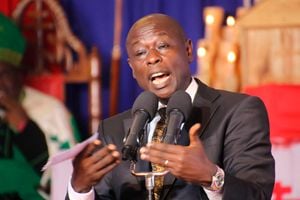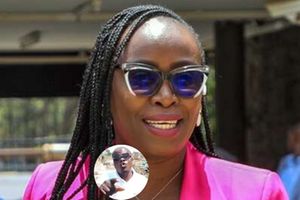Farewell Steve Jobs

What you need to know:
- The fallen Apple chief was regarded as one of the brightest brains of our times
Like most commencement addresses, the June 2005 speech delivered by Steve Jobs offered the college graduates pearls of wisdom as they finished their studies and prepared to embark on life’s way.
But the oft-cited graduation speech to students at Stanford University also offered a fascinating glimpse into the twists and turns of the Apple chief executive’s remarkable life, and the Zen-like philosophy that fuelled his creative passion and helped govern his tireless energy.
“You’ve got to find what you love,” Jobs told students in the now famous address, urging them as he wrapped up his speech to “stay hungry, stay foolish.”
The Apple visionary, then proceeded to recount his own story: a life presented in three acts, starting from his birth to a young unwed mother who put him up for adoption after first extracting a promise from the adoptive parents that they would one day send the baby to college.
Dropped out of college
“And 17 years later I did go to college,” Jobs recounted at Stanford.
“After six months, I couldn’t see the value in it,” he said. “I decided to drop out and trust that it would all work out OK,” he said, adding that he decided to abandon his studies at Reed College in Portland, Oregon, to found his ground breaking Apple Computers company at age 20 in his parent’s garage.
“It was pretty scary at the time, but looking back it was one of the best decisions I ever made,” Jobs recounted.
The lessons he learned, Jobs said, were much more far-reaching.
“You have to trust that the dots will somehow connect in your future. You have to trust in something — your gut, destiny, life, karma, whatever,” he said. “This approach has never let me down, and it has made all the difference in my life.”
Jobs shared more lessons gleaned from what was perhaps the low point of his professional life: his ouster by the board of directors from the helm of Apple in 1985 — a “devastating” episode marked, he said, by “love and loss.”
“How can you get fired from a company you started?”
But once again, what had appeared to be great misfortune emerged as a blessing in disguise.
“Something slowly began to dawn on me — I still loved what I did,” he told the Stanford students.
“I had been rejected, but I was still in love. And so I decided to start over. I didn’t see it then, but it turned out that getting fired from Apple was the best thing that could have ever happened to me,” he said.
“It freed me to enter one of the most creative periods of my life.”
Jobs described creating new startup ventures, both of which became wildly successful in their own right: Pixar, which now is the most successful animation studio in the world, along with the computer and software company NeXT.
The success of the latter venture paved the way for his triumphant return to Apple, when in a remarkable turn of events, Apple bought NeXT.
“I’m pretty sure none of this would have happened if I hadn’t been fired from Apple,” he said.
“It was awful-tasting medicine, but I guess the patient needed it. Sometimes life hits you in the head with a brick. Don’t lose faith.”
Find what you love
Jobs’s speech to the Stanford graduating class a half-dozen years ago — which has since been viewed more than 4.5 million times on YouTube and was replayed in its entirety Thursday on CNN — was filled with more sage advice, including, a caveat as they set about the task of choosing their life’s work.
“You’ve got to find what you love,” he said. “That is as true for your work as it is for your lovers.”
Another Jobsian gem: “Your work is going to fill a large part of your life, and the only way to be truly satisfied is to do what you believe is great work. And the only way to do great work is to love what you do. If you haven’t found it yet, keep looking.”
Yet another: “For the past 33 years, I have looked in the mirror every morning and asked myself: ‘If today were the last day of my life, would I want to do what I am about to do today?’ And whenever the answer has been ‘No’ for too many days in a row, I know I need to change something.”
The third act of Jobs’s speech dealt with his pancreatic cancer, the illness that ended up claiming his life.
“Remembering that I’ll be dead soon is the most important tool I’ve ever encountered to help me make the big choices in life,” he said.
“Remembering that you are going to die is the best way I know to avoid the trap of thinking you have something to lose. You are already naked. There is no reason not to follow your heart.”
The death of visionary Steve Jobs has left huge shoes to fill at Apple, with agile competitors mounting a continuous assault on the company’s hit iPhones, iPads and other ground breaking products.
Analysts said that for the short term, new chief executive Tim Cook has inherited a strong company with a powerful product line and has the skills to keep it going — though there remain questions over his ability to match Jobs’s acumen at picking winners in the consumer electronics market.
“Steve is too big a personality and too amazing of a businessman for him not to be missed,” Gartner analyst Van Baker said. “But the wheels aren’t going to come off; a lot of Steve’s qualities are embedded in the Apple culture.”
The company’s share price fell, and then rebounded, after the death of Jobs on Wednesday, which came after a long fight with pancreatic cancer and his handing over the reins to Cook in August.
“We believe Tim Cook is well-qualified for his new role as CEO and has at his disposal a deep and talented executive team in the areas of supply chain management, hardware/software design and product marketing,” said Canaccord analyst Michael Walkley.
The list of market-stunning products tied to Jobs, who co-founded Apple in 1976, is long: Mac computers, iPods, iPhones, iPads, and the operating systems behind them that while not as widely used as rival Microsoft’s, are revered as high-performance devices worth the premium prices usually charged.
Independent Silicon Valley analyst Rob Enderle called Jobs “the ultimate product tester.”
“Everything went through him,” Enderle said hours before his death. “As more products come out over time, they will have less of his handprint on them.”
Analysts
Jobs garnered regular standing ovations at conferences where he introduced them, including the latest version of the iPad in March this year and the iCloud cloud computing service in June.
Thirteen-year Apple veteran Cook, by comparison, underwhelmed in his launch of a new iPhone Tuesday: many fans believed there would be an all-new fifth generation version, but it turned out to be a modified iPhone 4, dubbed the 4s, and the company’s shares were sold off.
But analysts said the smartphone was a strong improvement and should fly off the shelves, and gave Cook a solid grade.
Canaccord’s Walkley said the model features important hardware upgrades, including a much faster processor and better camera, and improved antenna.
Overall for Apple, new capabilities in the operating system and the iCloud “will generate strong sales of iPhone 4S and increased (operating system) ecosystem stickiness to generate future recurring device sales,” he said.
“I don’t think Apple’s lost their mojo at all,” Gartner’s Baker told AFP after the iPhone 4s launch.
“All of this brouhaha will blow over, probably about the time they see people are buying a gazillion of the iPhones,” he continued. “In our view, iCloud has just gotten started,” said tech analyst Shaw Wu of Sterne Agee.
“And the iPhone and iPad are still relatively early in their adoption curve. And there are still untapped markets like broadcast television and streaming video.”
But company management experts have long identified Jobs with a rare skill of picking the products and product attributes that consumers will want, and over the longer term, the company’s future could rest on replicating that talent.
Cook, whom Jobs hand-picked to succeed him, acknowledged as much on Wednesday.
“Apple has lost a visionary and creative genius, and the world has lost an amazing human being,” he said.
“Steve leaves behind a company that only he could have built, and his spirit will forever be the foundation of Apple.”
Enderle, the Silicon Valley analyst, said: “Steve was the face of Apple and was an evangelical product marketer.”
“It is like a church following a beloved minister; that is not an easily transferrable skill set.”
But with extremely agile competitors getting out powerful rivals to Apple products to the market more and more quickly, Cook’s skills are also essential to Apple’s success.
He has worked behind the scenes outsourcing manufacturing and coordinating distribution to ensure new iPods, iPhones, iPads and Macintosh computers do not grow stale in warehouses.
He is also credited with shrewdly negotiating deals for components that kept down costs and fattened profit margins.
“I am confident that Apple can move forward under Tim Cook and his executive team and that Apple will continue to be one of the most important technology companies in the world,” analyst Tim Bajarin of Creative Strategies said. — AFP




